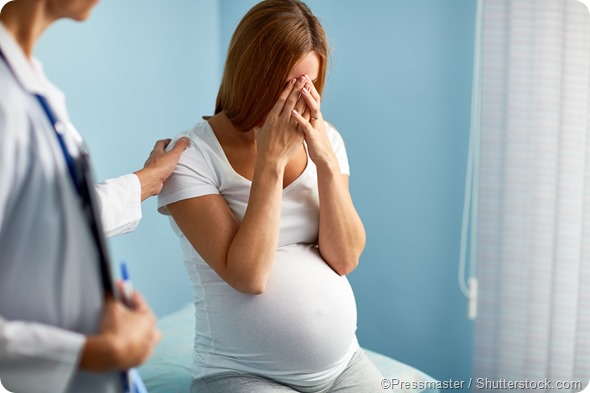Pregnancy denial is a term which refers to the condition in which a woman denies that she is pregnant. At 20 weeks of pregnancy, it is found in 1 of 475 women, but the incidence declines to 1 in 2500 at delivery.
Pregnancy denial may occur in both psychotic and non-psychotic forms. Furthermore, women with pregnancy denial may show different categories of the condition, such as frank denial, suspicion of pregnancy without conscious awareness, and complete knowledge of the fact that she is pregnant with denial and concealment of the condition.

Types of pregnancy denial
Women with psychotic denial of pregnancy have long-term mental disorders such as schizophrenia, which continues throughout pregnancy. They may waver between open acceptance and strong denial of their pregnancy. When they are in denial, they refuse to accept that their symptoms are to do with the pregnancy. They may have lost earlier children to child protection services, or may fear that they will lose the present child.
In cases of non-psychotic denial there may be three different types:
- Pervasive denial – this involves the woman not allowing the existence of pregnancy to enter her consciousness (36%)
- Affective denial – the woman is aware that she is pregnant, but is unwilling to allow it to affect her feelings about the event, or to take care of herself and the fetus during the pregnancy (52%)
- Persistent denial – the denial accompanies the awareness of pregnancy in the third trimester (11%), while the delivery may be associated with dissociation or conversion reactions
Causes and risk factors
Denial of pregnancy is thought to result from a failure to adjust to the conditions of pregnancy. These include the need to adapt to changing physical needs and demands, changing shape, prepare for birth and baby care, and develop early bonding to the fetus. All of this may result in overwhelming fears and doubts as to one’s own capacity to successfully carry and look after a baby, and in most severe cases, cause the patient to deny that she is pregnant.
Some studies have suggested that the following indicate a higher risk of pregnancy denial:
- Younger age
- First pregnancy
- Low degree of social support
- History of substance abuse or psychiatric disorder
Learning difficulty
More recent research contradicts these as necessary accompaniments of women who deny pregnancy. For instance, many such women are of average intelligence, have had children before, and have adequate levels of support. In these cases, the risk would appear to arise from:
- Psychological or emotional stresses, as for instance from an unwanted pregnancy
- External stressors such as having desirable jobs which are not compatible with pregnancy
Potential complications
Denial of pregnancy can cause complications to both the mother and the baby, including:
- Distress of mind
- No antenatal care
- Abuse of the fetus
- Delivery when alone and unassisted, leading to precipitous delivery into the toilet
- Neglect of the newborn
- Killing the newborn – this may be passive, in the case of non-psychotic denial. In such cases, the death is brought about by neglect and exposure, often because the mother becomes extremely disoriented following the birth. In the case of psychotic denial, the mother is more likely to kill the baby actively.
Diagnosis
Interestingly, in one study, almost 4 of every 10 women with denial had seen a doctor with symptoms such as nausea or abdominal pain, but without being diagnosed as pregnant. Thus the possibility of such a condition should be entertained in all women in the reproductive age with symptoms suggestive of pregnancy - irrespective of their protests that they are not pregnant.
By Wessel’s criteria, any woman who willfully does not receive antenatal care, or receives antenatal care only after 20 weeks of pregnancy and then suddenly delivers, may be presumed to have a denial of pregnancy. Women who do not perceive that they are pregnant even at 20 weeks or later also fit the diagnosis.
Management
When a woman in denial of pregnancy is seen, she requires emergency psychiatric management to avert the possibility of neonatal killing. Both medication and psychotherapy may be required, with the woman’s inner struggles being gently brought out into the open and acknowledged. Social and family support for the woman, and training in parenting skills, should be ensured.
Underlying psychiatric illnesses, if present, should be diagnosed and treated. Follow-up is crucial in all cases. Child safety should be kept paramount, with relevant agencies monitoring the health of the woman and the child. Any subsequent pregnancy should be kept under observation from an early stage.
Further Reading
Last Updated: Feb 27, 2019